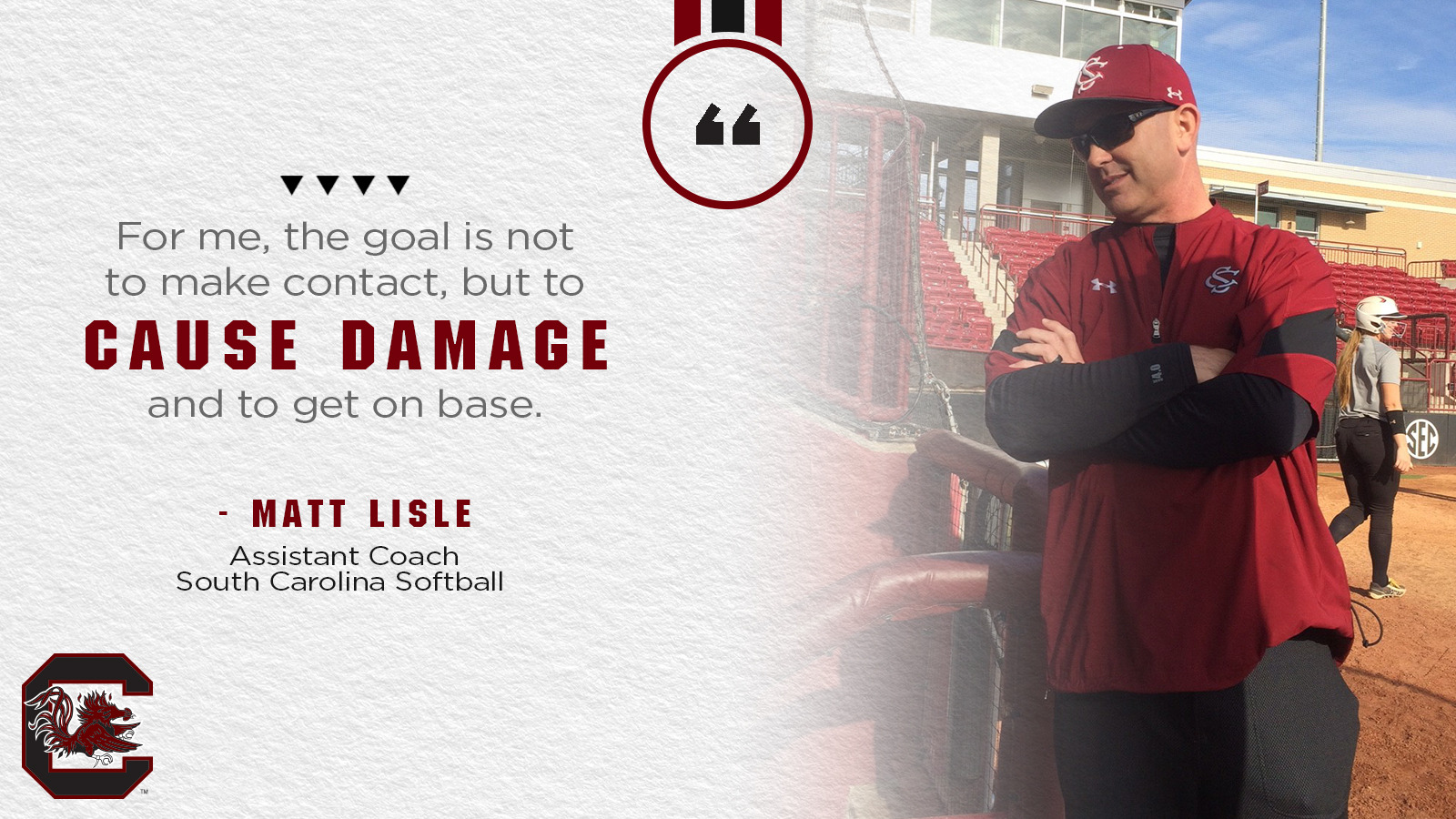
Softball Assistant Earning Fame Nationally as Hitting Coach
Jan. 31, 2018

South Carolina assistant softball coach Matt Lisle has made a name for himself as one of the top hitting coaches in the country. Lisle has specialized in helping softball and baseball players with their swing, ranging from high school age student-athletes to Major League Baseball players, and his following on social media has made him somewhat of a “rock star” in the field.
“My career has been interesting because I have about 500,000 followers (on social media),” Lisle said. “About four years ago, I thought social media would be a good vehicle to share my coaching philosophies.
“The demographics I resonate the most with are coaches, parents and players, so I thought I could start sharing things I think are valuable to them. For whatever reason, it just took off. I started getting Major League Baseball players to call me, and I got some job offers. It’s amazing the reach social media can have.”
Lisle is in his first season as an assistant coach with the Gamecocks after serving as the head coach at Menlo College in California. His background includes stints as a college head softball coach and assistant coach, college baseball assistant coach, and high school baseball head coach. Wherever he’s been, it’s his knowledge of hitting that has made a difference for each team.
“I dug into hitting, and I learned from some really good coaches on hitting,” Lisle said. “That sparked my passion. The deeper in the rabbit hole I got, the more I loved it.”
Lisle noted that he plans to use his success on social media to help in recruiting and marketing the South Carolina program.
“It’s a great way to show what we do here,” Lisle said. “Not just what I do as a hitting coach, but our culture and values in the program here at South Carolina. Now recruits can really see what it’s like here. I try to share a lot of hitting and coaching tips.”
That leads to Lisle checking social media notifications on his phone a couple hundred times per day.
“It’s all business, and it’s not like I’m sharing cat memes on Instagram,” Lisle chuckled. “Everything I do on there has a purpose.”
I try to change the mindset of what mistakes are.
Matt Lisle
Lisle’s approach at the plate for the Gamecocks is about what he calls “doing damage.”
“We want to choose pitches that we can do damage on,” Lisle said. “Generally speaking, a goal for a lot of teams and coaches is to make contact. For me, the goal is not to make contact, but to cause damage and to get on base. Hopefully with our group this year, you’ll see better power numbers and better on-base percentage numbers. The focus is about choosing the right pitch and doing damage with it.
“We have a saying of ‘no ground balls,’ unless you’re a slapper or someone with a lot of speed. I look at angles and launch angles. We want to hit the ball in the air. There’s a lot more square footage in the outfield with fewer people there than there is in the infield.”
With that being said, hitting is not a one-size-fits-all approach, and hitting coaches often wrestle with how much they should change an individual’s swing.
“There’s give and take at our level because they got here for a reason. The best advice I ever got was to never turn a .400 hitter into a .200 hitter. I try to hold on to that pretty tightly,” Lisle laughed. “So, I focus on how to improve on what they do without taking away the things they do well. Cookie-cutter does not fit.
“The biggest challenge is getting them to buy in to the philosophy of doing damage by putting the ball in the air,” Lisle said. “Some players are so engrained with the idea of just making contact and putting the ball on the ground. Some players see a deep fly ball out to centerfield as a mistake. I don’t see it that way. I try to change the mindset of what mistakes are.”
Having coached softball and baseball, Lisle said he has enjoyed the coachability he has found with softball players.
“In my experience, coaching girls and young women, they just listen better and buy-in better,” Lisle said. “There’s been more ability to instill what I believe about hitting in my experience. There are less roadblocks than there have been with baseball. The posture in learning has been a little better in softball.”
That’s not to say he hasn’t had success with baseball players, as Lisle has worked with plenty of Major League Baseball players including Joc Pederson of the L.A. Dodgers, Mitch Haniger of the Seattle Mariners, and Daniel Descalso of the Arizona Diamondbacks.
“I still help out some Major Leaguers,” Lisle said. “Sometimes it’s just over a text message. Last off-season before spring training, I probably worked with 40 guys all day long. Now, it’s text messages and they send me a video to look at.”
Lisle and his wife, Jessica, have five children. In what little spare time he has outside of family and work, Lisle enjoys golf, although he hasn’t played since he moved to Columbia, and he admits he could use a little help with his swing.
“I do need a swing coach for golf,” Lisle laughed. “Golf is my favorite sport, but I’m not very good at it. I love it because it is so challenging. The golf course teaches you full ownership. You can’t blame anybody but yourself.”



















